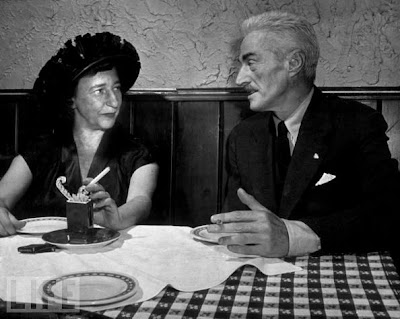Robert Browning and Elizabeth Barrett
The conjunction of Robert Browning and Elizabeth Barrett is a tale of twinned eclipses. Monarchs of Victorian letters, the Brownings were sentimental favorites in the public mind, devoted and inseparable Gemini of ars poetica. Her reputation overshadowed his at first; posterity would reverse their positions. Mid-nineteenth century British spinster Elizabeth Barrett lived a life of seclusion in a fusty, third-floor back bedroom in the household of her tyrannical father at No. 50, Wimpole Street, London. Her father, a slave-owner with a plantation in Jamaica, treated his children as property, and forbade any of them to marry. Talented poetess Elizabeth was tubercular, and her illness contributed to her life as a shut-in but, matters of health aside, she was a virtual prisoner in her father’s home. When she became the object of admiration in a courtship-by-correspondence from rising literary star Robert Browning, several years her junior, she was flattered and amazed. Dazzled by the attentions of the dashing young poet, Elizabeth’s relationship with Browning quickly progressed from “postal friendship” to full-blown romance. Secretly, the pair conceived a plan to wed and spend their lives together in connubial bliss. On the way to the church to officially consecrate the blending of their destinies, the Brownings had to stop their carriage when Elizabeth was so overcome by emotion and fatigue that she fainted and had to be revived with sal volatile — smelling salts procured from a local pharmacy. A week later, she snuck downstairs and bid farewell to Wimpole Street forever, rushing to keep a faithfully appointed rendezvous with Robert before making a fevered sprint for the coast. The fateful pair successfully eloped to Italy, first settling in a rented apartment in Pisa, near the leaning tower. Sustained by the happiness of her new domestic habitat and the healthy climate of her adopted land, Elizabeth quickly shed her accustomed status as ailing invalid and hopeless valetudinarian. Her letters home to her father were returned unopened. Then they moved to a magnificent new home in Florence, the Casa Guidi, where their son was born. Elizabeth died in 1861, after their love affair had captured the imagination of the world. Robert pledged himself to her for all eternity and died twenty-eight years later. More famous for the hearts and flowers that enwreathed their image than for their work, Elizabeth was the more popular poet of the two during the years of their marriage, though Robert eventually outgrew a dull reputation and finally found his place among the stars of the literary firmament. Bearded, deep-browed, and universally respected, he became a convivial old man of letters and a fixture on the formal dinner circuit.
Lillian Hellman and Dashiell Hammett
They met first in Hollywood around 1930, found instant rapport, and remained an item for the next thirty years. She wrote plays about nasty children and avaricious cousins; he was the dean of hard-boiled detective fiction, creator of pre-eminent private dicks Nick Charles and Sam Spade. Besides melding pheromones, the two meshed ideologically, sharing political positions which they frequently put into action. In the volatile climate of the 1930s, 1940s, and 1950s, these propensities often put them afoul of the authorities and, during the HUAC probes of the McCarthy era, Hammett found himself incarcerated and Hellman brought before an investigative committee sniffing out reds in Tinseltown. The pair seemed to have assigned themselves roles in some sort of secret espionage narrative, inserting themselves in political intrigues according to some higher but inscrutable personal code. This murky, moral-political agenda to which they had pledged themselves supplied the cement that kept them close even as each bedded any number of other lovers. In the end, their mutual urge to protect and defend one another prevailed. Hellman’s much-publicized memoirs jealously defended Hammett’s reputation, both professionally and personally; her insistence on editing his uncollected works for posterity was so heavy handed as to raise suspicions as to her true motives…
***






One response
this was great, especially the balzac and gertrude stein parts.
Click here to subscribe today and leave your comment, or log in if you’re already a paid subscriber.